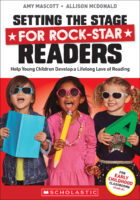5 Must-Know Tips from Setting the Stage for Rock-Star Readers
Help young students develop a lifelong love of reading with these 5 expert tips from the bestselling book Setting the Stage for Rock-Star Readers.
Written for early childhood educators by educational experts Amy Mascott and Allison McDonald, Setting the Stage for Rock-Star Readers features lots of fun, developmentally appropriate activities that build oral language and early reading and writing skills. This book is a must-have resource for teachers in daycare, preschool, and kindergarten.
Buy your copy of Setting the Stage for Rock-Star Readers here.
Mascott and McDonald break down the whys and hows of early literacy into easily digestible bite-sized pieces to help busy teachers support their youngest learners’ individual development without pushing them too hard. To whet your appetite, check out these 5 great tips from the book.
Fill Your Classroom Library with the Right Books
This is not a simple task. You can do a good job just filling a shelf, but you can do a great job by filling that shelf with the right books. Finding the right books means knowing your young students, picking books that support your curriculum, and balancing fiction and nonfiction choices. Any early childhood classroom will have a wide spectrum of literacy development, and your classroom library should reflect that.
Check out these favorite read-alouds for grades PreK-3.
Create a Book Nook
The term “book nook” may sound like a cozy, almost-hidden cove in your room. But hidden is never a good idea in an early childhood classroom. Teachers need to be able to count heads and scan the crowd to see who might need help at any given time, so book nooks should not be tucked away, out of sight. Make your nook more inviting by adding little touches like lamps, pillows, and stuffed animals.
Organize a Book Parade
What’s a book parade? A book parade is another term for a book showcase, in which you line up a group of books along a shelf, table, or windowsill to show off their covers with the intention of building interest. It’s a print-awareness party at its most basic. Book parades are an ideal way to invite kids to get a really good look at the books in your classroom and perhaps to open a book that didn’t catch their eye before.
Encourage Your Students to Ask Questions
Questioning is one skill children can really run with when they’re let loose. Any educator—scratch that—any adult who spends time around children knows they ask many questions. And they should. We want young children to be curious about the world around them and to seek answers to their questions all the time. That’s how they learn! During read-alouds, if we encourage questioning about the subject at hand, children will grow to be readers who question and think as they read.
Ask Your Kids to Make Predictions
Asking young children to predict—or make some logical guesses about—what’s to come in a book you’re reading is a critical skill. Strong readers do this every day, all the time, without thought. We’re always formulating predictions in our minds as we read. Predictions give us a reason to read on, as we try to figure out whether our predictions are accurate or not.
Learn more about Setting the Stage for Rock-Star Readers here.




